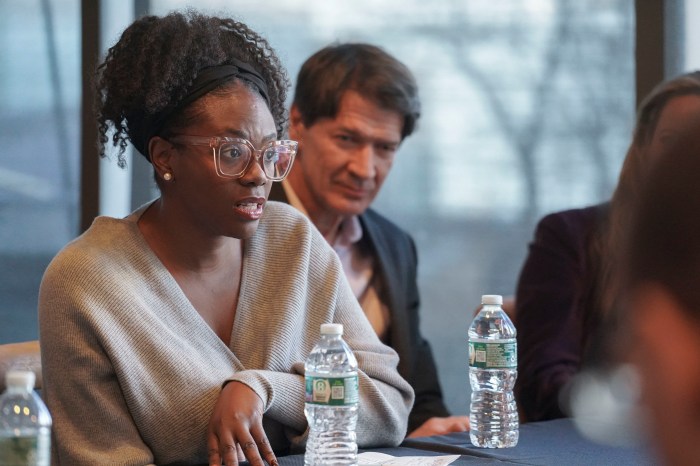Traffic already dangerously fast
To The Editor:
Re “Houston St. plan rapped as pro-auto” (news article, Jan. 21):
Thank you so much for your coverage of the Houston St. proposed reconstruction.
I frequently visit and shop in both Noho and Soho and have always been horrified at how pedestrians have been treated in that area. Fast cars, long waits at intersections and short times given to cross exemplify how people walking are almost always shortchanged by the desire to rush cars through an area.
Houston St. is already used as a shortcut by too many speeding cars and the redesign would only further contribute to the headache and danger involved in being there. The redesign should slow cars down and allow pedestrians, as positive contributors to the street fabric, life and economy of the surrounding neighborhoods, to have enough space and time to flow freely and safely across Houston St.
Annie Hart
Big chill thaws on Barrow St.
To The Editor:
Re “Baby it’s cold inside: Barrow St. tenants lack heat” (news article, Jan. 21):
We want to thank you for your concern. Since your article we’ve had uninterrupted heat and hot water for the first time in years. The tenants are so grateful. Your diligence and concern are much appreciated.
Gabrielle Boone-Jones
Incident involved illegal vendor
To The Editor:
Saturday an N.Y.P.D. officer died while arresting an illegal vendor selling copyright-infringed merchandise in Soho. This is a doubly unfortunate incident, unfortunate that an N.Y.P.D. officer died and unfortunate in its timing, the weekend before the New York State Assembly will vote on the new vendor law. We can expect that it will be cynically used by the business improvement districts to justify the passing of the new law.
The truth is that the new vending law is not aimed at illegal vendors or copyright infringers. It’s aimed at disabled U.S. veteran vendors, book vendors and street artists, all of whom are 100 percent legal vendors. Passing the new law will have zero effect on illegal vendors or copyright infringers. If this new law had already been in effect, it would have made no difference in avoiding this unfortunate incident.
When this new law is passed it will require a tremendous increase in enforcement against legal street artists, book vendors and disabled veteran vendors. Some of these legal vendors will calmly submit to enforcement as we always have, whether it’s legal or illegal enforcement, while others may try to escape. Inevitably, some vendors, some officers or some members of the public will get hurt.
In a time where the N.Y.P.D. is on high alert seeking alleged terrorists, does it make any sense to massively misuse the Police Department’s limited resources against street artists and disabled veteran vendors? It makes no sense to assign our already overworked police officers to enforce a new misguided law by hundreds of summonses and hundreds of arrests of legal vendors, a law that will very likely be overturned by the first court it gets challenged in.
Robert Lederman
Lederman is president of A.R.T.I.S.T. (Artists’ Response To Illegal State Tactics)
Village View lobbies are just fine
To The Editor:
Re “Some at Village View oppose renovation of lobbies” (news article, Jan. 28):
I am a shareholder of Village View and a former member of the board of directors. Mr. La Valva’s remark that the lobby renovations are a necessity is false. We are in need of: 1.) boilers, which were only just recently installed; 2.) facade repairs under Local Law 11, which are mandatory; 3.) windows that keep the wind and cold out; 4.) roof repairs, which are more important than any other work as unnecessary as lobby renovations. The one disabled person who wants to get her mail will settle for installation of a lift for $20,000 or a ramp at the back entrance of her building so she can get her mail. Anything more expensive will put a burden on Village View that we will be paying off for 10 years or more, and we will never be out of debt.
Laureen Andruseaski
I have a dream…of Board 2 unity
To The Editor:
Re “King Day controversy roils C.B. 2” (news article, Jan. 28):
Thanks for a well-balanced story.
Sean Sweeney
Democrats have forgotten poor
To The Editor:
While the Democratic presidential hopefuls feverishly compete for middle-class votes, the so-called underclass hardly ranks a mention on the hustings. Their absence from the Democrats’ electoral agenda mirrors the country’s attitude toward the non-working poor.
The underclass was last a national political topic in 1996, when time limits were placed on welfare. Personal responsibility was the political battle cry, while slums were depicted as breeding grounds for welfare queens, deadbeat dads and super-predator teens. Since then, public assistance rolls, crime rates and crack addiction have declined, temporarily settling the debate over social policy in favor of the tough love (i.e., punitive) approach. As such, the public now mostly ignores the needy.
Don’t look for this neglect to be addressed on the current campaign trail. Self-sufficiency is still the nation’s watchword, meaning that there isn’t much sympathy for people who depend on government assistance. The dispossessed also have little political leverage, since few of them vote.
Many Democrats are undoubtably relieved that the underclass is out of the electorate’s consciousness. Office-seekers who embrace them risk getting tagged with the dreaded liberal label. Fearful of becoming an easy target for conservatives, the party has bet its future on working people; voters who, in Clintonian jargon, play by the rules.
Meanwhile, the underclass is threatening a return to the political radar screen. Homelessness has spiked in New York and other cities, while financially strapped local governments are releasing prisoners as soon as possible — after years of warehousing them.
Such indifference makes for a less inclusive Democratic Party, as well as a divided society.
Ben Krull































